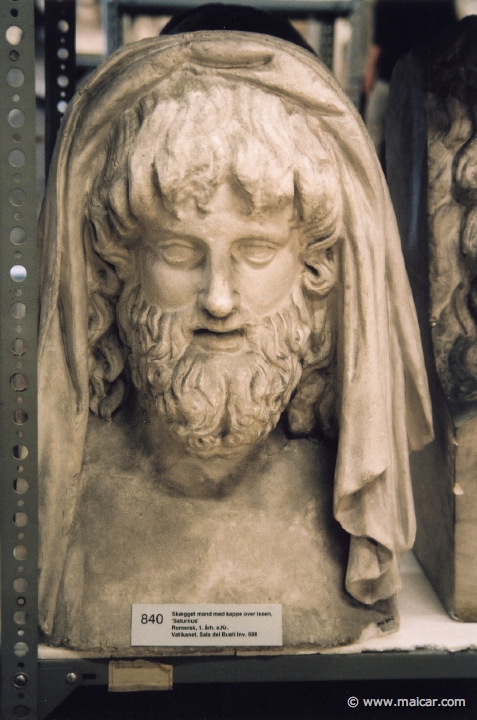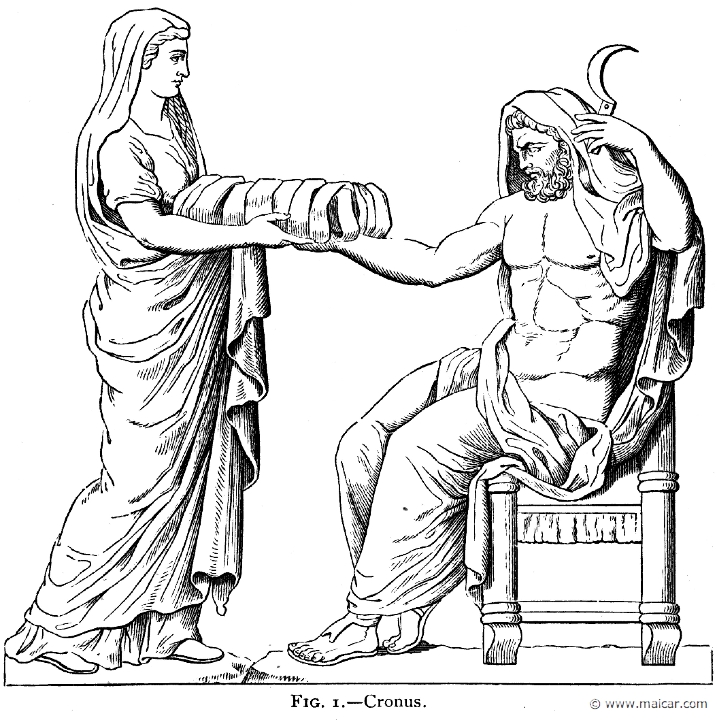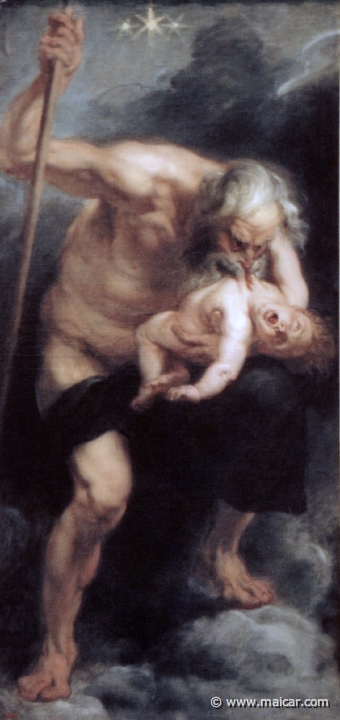|

|
Cronos. 8910: Skaegget mand med kappe over issen. 'Saturnus'. Romersk 1 årh. e. kr. Vatikanet, Sala dei Busti (Royal Cast Collection, Copenhagen).
|
|
|
"There are new rulers in heaven, and Zeus governs with lawless customs; that which was mighty before he now brings to nothing." (The OCEANIDS to Prometheus 1. Aeschylus, Prometheus Bound 150).
"Thou best of kings, thou shall be ousted of thy sceptre by thy son." (Oracle given to Cronos. Ovid, Fasti 4.197).
|
|
Cronos is the wily, youngest and most terrible
of the children of Uranus, whom he hated. He
castrated his father and became ruler of the
universe, but was later overthrown by his own son Zeus.
Children of Uranus
Cronos' father Uranus (Sky) is counted as the first to have ruled the
Universe. He was the son of Gaia (Earth) or, as others
say, the son of Aether (the Upper Sky) and Hemera
(Day). Uranus married Gaia, and had children by
her among which the HECATONCHEIRES,
who had hundred hands and fifty heads, and the CYCLOPES, who had only
one eye in their forehead. Uranus, for some
reason or other, hated these children of his and
hid them away in a secret place on earth, or as
others say, cast them into Tartarus, which is a
gloomy place in the Underworld as far
distant from earth as earth is from the sky.
However, Gaia, grieved at
the destruction of her gifted children, and being
strained and stretched with so many giant beings
inside her, planned the destruction of her own
husband and his rule as a way to set them and
herself free.
Cronos eager to revolt
In order to overthrow him, Gaia tried to persuade the TITANS, who were also her
own children by Uranus,
to attack their father, but these were afraid,
excepting Cronos who immediately said:
"Mother, I
will undertake to do this deed, for I reverence not
our father of evil name, for he first thought of
doing shameful things." (Cronos to Gaia. Hesiod, Theogony 170).
In order to accomplish the seditious purpose, Gaia gave Cronos an
adamantine sickle with jagged teeth, which is said
to have been made by the TELCHINES. And when Uranus by night
approached Gaia longing for
love, Cronos came out from his hiding place and cut
off his father's genitals, throwing them into the
sea behind his back at cape Drepanum in Achaea. And from the foam
which gathered round the severed genitals, lovely Aphrodite was born
after a long time, but from the drops of flowing
blood that fell on Earth the ERINYES were created,
who avenge crime and wickedness, and punish those
who are guilty of bloodshed within the family.
Power changes the mind
This is how the TITANS dethroned their father and first ruler of the
Universe, committing the sovereignty to Cronos, who
was the youngest of them all. Having thus succeeded
his father, Cronos brought up the CYCLOPES and the HECATONCHEIRES, who were prisoners in Tartarus. But Power changes the mind, whereas there is no mind able to change the nature of Power. So, when Cronos became ruler, he started seeing things in the same way as the predecessor he had dethroned had seen them; and soon he again bound and shut his brethren up in the same dark depth. Cronos was affected, for having attacked his
father, by what later came to be called the
"Punishment of Neoptolemus", which
consists in suffering oneself what one has done to
another, or almost. Soon Cronos was prophetically
informed by his parents that he would be dethroned
by his own son.
Cronos devours his offspring
And believing that these fateful news could be
averted, he started to swallow his offspring at
birth. But once the procedure had been repeated
several times, her wife and sister Rhea 1, feeling for her
children as Gaia for her
own, deceived her husband by wrapping a stone in
clothes and giving it to him to swallow, as if it
were the newborn child Zeus. Some say that when Rhea 1 brought the stone
to Cronos, he, believing the stone to be a child,
bade her offer milk to the baby. Rhea 1 then pressed her
breast, and the flowing milk created the stars that
are known by the name of the Milky Way.
|

|
Rhea 1 gives Cronos a wrapped stone to swallow, as if it were the child Zeus. mur001: Cronos and Rhea. Alexander S. Murray, Manual of Mythology (1898).
Note: English translations of Hesiod 477-485 (for example Evelyn-White's or Dorothea Wender's) appear to say that Gaia, and not Rhea, gave Cronos the stone to swallow. But modern authors, dictionaries and manuals have since long ago followed exclusively the version saying that Rhea gave her husband the stone wrapped in swaddling clothes as if it were the baby Zeus. This version is originally found in the works of Apollodorus and Pausanias among other ancient sources. The name of the subject in verse 485 of the Theogony is not mentioned, but the Hesiodic context suggests, in more than one way, that Gaia and not Rhea gave the stone to Cronos.
|
|
Rhea 1 saves Zeus
Having thus deluded her husband, Rhea 1 went to Crete where she gave birth
to Zeus in a cave in Mount Dicte. And while the child was fed by NYMPHS on the milk of
Amalthea the goat, the CURETES who guarded the cave
clashed their spears on their shields in order that
Cronos might not hear the child's voice.
Cronos meets Philyra 1
In the meantime, Cronos, having realised that he
had been deluded by means of a stone, was hunting
his child Zeus throughout the earth. During his search he met the Oceanid Philyra 1 and consorted with her. By him she bore the wise Centaur Chiron, but later, when Philyra 1 saw the strange species she had given birth to, she asked Zeus to change her into
another form, and he turned her into the tree
called linden.
What was said in Arcadia
The Arcadians are reported to have said that
when Rhea 1 gave birth to Poseidon, which she did
before she gave birth to Zeus, she declared to
Cronos that she had given birth to a horse.
Apparently Cronos had no reason to disbelieve his
wife, for gods are capable of anything, and so Rhea 1, who had laid Poseidon in a flock of
lambs to live with them, gave him a foal to swallow
instead of the child. This account has been
considered to be both foolish and wise, for wisdom
at times appears as foolishness, being sometimes
difficult to tell one from the other, specially
when riddles and hidden meanings are suspected. And
the Arcadians also said that in a wonderful
mountain near Methydrium, Rhea 1 enlisted, when she was pregnant with Zeus, the giant Hopladamus
as an ally against Cronos, whom she feared might
attack her, adding that it was in that place that
the substitution of a stone for the child took
place. The stone itself, however, was shown at Delphi, not far away from
the tomb of Neoptolemus, whose "punishment" Cronos shared. Olive oil was poured on the stone every day, and on special occasions unworked wool was placed on it.
The Divine Vomit
In any case, Cronos was later forced to disgorge the children that he had previously swallowed through a drug that the Oceanid Metis 1 gave him. So when the gods had been vomited, they aided Zeus in waging war against
Cronos and the TITANS,
for Zeus had promised that
whosoever would fight with him against the TITANS, would keep the
office he had before, adding that he who was
without office or right under the rule of Cronos,
should be raised and acquire them.
Zeus banishes Cronos
|

|
Cronos devouring his offspring. 9824: Peter Paul Rubens 1577-1640: Saturno. Museo Nacional del Prado.
|
|
The TITANS, who fought
from Mount Othrys in Thessaly, were defeated when
the CYCLOPES and the HECATONCHEIRES sided with the gods, who fought from Mount Olympus.
When Zeus had conquered the TITANS he bound them in
chains and shut them up in Tartarus to live in
darkness, for Night spreads
about it in triple line.
Men cannot do as gods do
Some have thought that neither Cronos nor Zeus honoured their
fathers, and that consequently, men could do the
same or even worse against their own, but Apollo reminds that Zeus was able to undo
Cronos' fetters whenever he wished, for gods have
at their disposal many remedies,
"But when the
dust has drawn up the blood of a man, once he is
dead, there is no return to life." (Apollo to the ERINYES. Aeschylus, Eumenides 645).
The rule of Cronos
Despite all these events, which some have called
barbarous, Cronos has been celebrated for having
ruled the world under the period known as the Golden Age,
which is the first age of man. At this time there
were no punishments, no swords, no helmets and no
threatening words, and even to eat the flesh of
oxen was held a crime. And being so, war was
unknown and life passed in gentle ease. This was
the time when spring was everlasting, and streams
of milk, nectar and honey flowed in abundance. And,
as unbelievable as it sounds, this was the nature
of the rule held by the one who castrated his
father: a time and a rule without pain, during
which the earth, without compulsion, brought forth
great stores of all kinds of needful things, and
men lived secure never cheating or destroying each
other.
More about his rule
During the reign of Cronos, they say, men did
not have children, for at that time, when the
universe revolved backwards, all humans came out of
the earth and were therefore called AUTOCHTHONOUS. And
for that very reason there were no families or
states and nothing of what comes with them.
Instead, humans had the ability of conversing, not
only among themselves, but also with all kinds of
animals, and were able to learn from every
creature. For all these reasons the men of the Golden Age are
believed in any respect to have been happier than
those of the following ages. This rule lasted until Zeus overthrew his father
and banished him to Tartarus, land of darkness and
death in the depth of the Underworld. Later, however, Zeus released Cronos from his bonds and let him rule the Islands of the Blest, a place where the virtuous come after death, retaining their faculties and enjoying a life free of care (see also Underworld &
Afterlife).
Note about Cronos and Chronos
The name Chronos appears in several authors such as Aeschylus,
Sophocles, Pindar, Quintus Smyrnaeus, Cicero and
Nonnus. He is identified with Time, but some of
them say that he is the same as Cronos (Saturn). Chronos is said to be
the father of the HORAE,
of Aether and Eros. In this
version (Nonnus), the HORAE are regarded as
Hours instead of Seasons. Chronos appears as
father of Aether (the upper sky) and Eros in the Argonautica
Orphica.
|